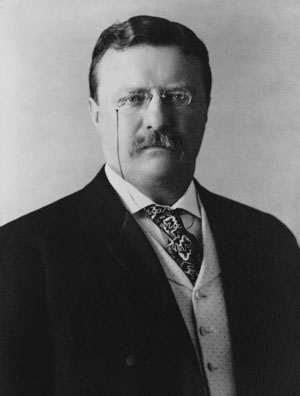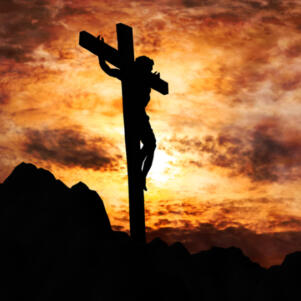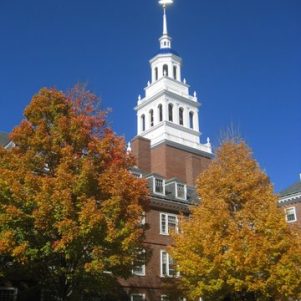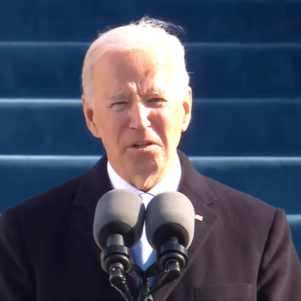Proclamations for the Soul of the Nation
By Joseph Tortelli | November 22, 2017, 16:30 EST
 Theodore Roosevelt, 1904 (Wikimedia)
Theodore Roosevelt, 1904 (Wikimedia) On October 3, 1863, President Abraham Lincoln reinvigorated the tradition of the Presidential Thanksgiving Proclamation. Lincoln selected a date precisely 74 years after President George Washington had inaugurated the Thanksgiving Proclamation on October 3, 1789. Like the first President, Lincoln designated the last Thursday in November as a day for Americans to give thanks.
Unlike the founding father, Lincoln was unable to speak of the immeasurable blessing of a nation at peace. Instead, he expressed gratitude for the continued development of the nation in the throes of a Civil War. “No human counsel hath devised nor hath any mortal hands worked out these great things,” Lincoln wrote about the country’s rapid material progress. “They are gracious gifts of the Most High God, who, while dealing with us in anger for our sins, hath nevertheless remembered mercy.”
As Commander-in-Chief of a nation struggling to preserve its own existence and ideals on bloody battlefields, Lincoln could hardly ignore the afflictions that warfare was placing on the citizenry. “And I recommend to them that while offering up the ascriptions justly due to Him for such singular deliverances and blessings,” the president observed, “they do also, with humble penitence for our national perverseness and disobedience, commend to His tender care all those who have become widows, orphans, mourners or sufferers in the lamentable civil strife in which we are unavoidably engaged ….”
In today’s era when media types frequently criticize political partisanship and incivility, it is wise to ponder the degree of real divisiveness that once split the nation. Perhaps, we should offer thanks for the genuine domestic peace that holds our country together to this day.
By way of contrast with Lincoln’s presidency, Washington issued his proclamation acknowledging “the favorable interpositions of his Providence which we experienced in the course and conclusion of the late war — for the great degree of tranquility, union, and plenty, which we have since enjoyed ….” Of note to contemporary political controversies, the President specifically mentions “the civil and religious liberty with which we are blessed,” along with asking divine guidance “to promote the knowledge and practice of true religion and virtue.”
Returning to similar themes in his second and final Thanksgiving Proclamation of 1795, Washington implored “humbly and fervently to beseech the kind Author of these blessings graciously to prolong them to us; to imprint on our hearts a deep and solemn sense of our obligations to Him for them … to extend among us true and useful knowledge; to diffuse and establish habits of sobriety, order, morality, and piety, and finally, to impart all the blessings we possess, or ask for ourselves, to the whole family of mankind.”
Washington understood the important role religion played in protecting liberty and civility in a democratic republic. We should be thankful that “the free exercise of religion” is protected by the First Amendment to the Constitution, and be grateful to those who today advocate on behalf of religious liberty.
Washington’s vice president and successor John Adams also issued two Thanksgiving Proclamations during his term as chief executive. In 1798, the second president pointed to the blessing of our civil and religious freedom and privileges. Echoing the Pilgrim and Puritan heritage of his own Massachusetts, Adams stipulated: “I do hereby recommend, that Wednesday, the 9th day of May next, be observed throughout the United States as a day of solemn humiliation, fasting, and prayer … that all religious congregations do, with the deepest humility, acknowledge before God the manifold sins and transgressions with which we are justly chargeable as individuals and as a nation, beseeching Him at the same time, of His infinite grace, through the Redeemer of the World, freely to remit all our offenses, and to incline us by His Holy Spirit to that sincere repentance and reformation which may afford us reason to hope for his inestimable favor and heavenly benediction … that the principles of genuine piety and sound morality may influence the minds and govern the lives of every description of our citizens, and that the blessings of peace, freedom, and pure religion may be speedily extended to all the nations of the earth.”
In this case, Adams directly invokes the Trinity: God, the Redeemer, and the Holy Spirit. At the time, the United States was overwhelmingly Protestant, and direct references to specifically Christian beliefs was accepted, and likely warmly embraced, by the vast majority of citizens. Unlike the Anglican/Episcopalian Washington, Adams was a Congregationalist, who like some New England contemporaries infused nascent Unitarian tenets into their ancestors’ traditional Calvinism, yet he did not refrain from referring to the Trinity, a belief common to most of his countrymen.
After Adams, the Proclamation fell into disuse for more than a decade, until President James Madison issued a pair in response to the War of 1812. One year after the June 18, 1812 Declaration of War against Great Britain, Madison wrote: “Whereas in times of public calamity such as that of the war brought on the United States by the injustice of a foreign government it is especially becoming that the hearts of all should be touched with the same and the eyes of all be turned to that Almighty Power in whose hand are the welfare and the destiny of nations.”
Three months following the Christmas Eve 1814 Treaty of Ghent that ended the war, the president, expressing gratitude for peace, asked that the second Thursday of April be “observed by the people of the United States with religious solemnity as a day of thanksgiving and of devout acknowledgments to Almighty God for His great goodness manifested in restoring to them the blessing of peace.”
To this day, we are forever grateful to the soldiers who leave their homes and families and put themselves in harm’s way to serve this country and protect our liberties. Unlike the citizens of Madison’s time, we don’t live in fear of an invading army putting our nation’s Capitol and the White House to the torch, as the British did in 1814. Nonetheless, we remain alert to the risks of terrorist violence here and abroad.
After the Madison Administration, no additional Thanksgiving Proclamations were issued until the Civil War. The calamity of disunion inspired President Lincoln to restore the tradition of Thanksgiving Proclamations and settle upon the last Thursday in November as the appropriate date. In his final proclamation a mere six months before his assassination, Lincoln acknowledged the mercy and guidance of the Almighty during the bloody fighting to preserve the Union. “He has largely augmented our free population by emancipation and by immigration,” noted Lincoln, “while He has opened to us new sources of wealth and has crowned the labor of our workingmen in every department of industry with abundant rewards. Moreover, He has been pleased to animate and inspire our minds and hearts with fortitude, courage, and resolution sufficient for the great trial of civil war into which we have been brought by our adherence as a nation to the cause of freedom and humanity, and to afford to us reasonable hopes of an ultimate and happy deliverance from all our dangers and afflictions.”
Following Lincoln, Thanksgiving Proclamations became an annual tradition for every president. Citing God’s providence to end the Civil War, his successor Andrew Johnson wrote: “Whereas it has pleased Almighty God during the year which is now coming to an end to relieve our beloved country from the fearful scourge of civil war and to permit us to secure the blessings of peace, unity, and harmony, with a great enlargement of civil liberty … And I do further recommend that on that occasion the whole people make confession of our national sins against His infinite goodness, and with one heart and one mind implore the divine guidance in the ways of national virtue and holiness.”
The first President to issue eight Proclamations during two terms in office was victorious Civil War General Ulysses S. Grant. In 1876, his final full year in office, Grant declared: “… in addition to these favors accorded to us as individuals, we have especial occasion to express our hearty thanks to Almighty God that by His providence and guidance our Government, established a century ago, has been enabled to fulfill the purpose of its founders in offering an asylum to the people of every race, securing civil and religious liberty to all within its borders, and meting out to every individual alike justice and equality before the law.
“It is moreover,” Grant added, “especially our duty to offer our humble prayers to the Father of All Mercies for a continuance of His divine favor to us as a nation and as individuals.”
Giving thanks for peace and prosperity, along with expressing gratitude for avoiding widespread pestilence in an era preceding the discovery of antibiotics, became the presidential norm during what became known as the “Gilded Age.” Then in 1899, President William McKinley took particular note of the end to the Spanish-American War. The Treaty of Paris had ceded Spanish territories in Guam, Puerto Rico, and the Philippines to the United States. Regarding one of those territories, McKinley stated: “The hurricane which swept over our new possession of Puerto Rico, destroying the homes and property of the inhabitants, called forth the instant sympathy of the people of the United States, who were swift to respond with generous aid to the sufferers.”
This year, another severe hurricane has torn through Puerto Rico disrupting families and taking lives. More than a century later, the Commonwealth of Puerto Rico remains an integral part of the United States. Let us be grateful to those stateside who today “respond with generous aid” for their fellow American citizens in Puerto Rico and for others in need around the globe.
The next year, McKinley unveiled the wider scope of the country’s growing international footprint. Characterized as the rise of American imperialism and criticized as interventionism, America has ever since extended its global reach, sometimes enhancing peace, freedom, and national security, while other times getting drawn into endless quagmires at the cost of blood and treasure. “Our commerce has spread over the world,” explained McKinley, a Methodist intent on improving people’s lives whether at home or in the newly acquired possessions. “Our power and influence in the cause of freedom and enlightenment have extended over distant seas and lands. The lives of our official representatives and many of our people in China have been marvelously preserved. We have been generally exempt from pestilence and other great calamities; and even the tragic visitation which overwhelmed the city of Galveston made evident the sentiments of sympathy and Christian charity by virtue of which we are one united people.”
Only a year later, Theodore Roosevelt, who became a national hero leading the Rough Riders up San Juan Hill in the Cuban front of the Spanish-American War, was lamenting the assassination of President McKinley at the hands of a violent left-wing anarchist. “This Thanksgiving,” the colorful and exuberant former Vice President observed about his low-key, businesslike predecessor, “finds the people still bowed with sorrow for the death of a great and good President. We mourn President McKinley because we so loved and honored him; and the manner of his death should awaken in the breasts of our people a keen anxiety for the country, and at the same time a resolute purpose not to be driven by any calamity from the path of strong, orderly, popular liberty which as a nation we have thus far safely trod.”
In other Thanksgiving Proclamations, Teddy Roosevelt, known for using the presidency as a “Bully Pulpit,” expressed deepened concerns about whether America would continue to produce a virtuous citizenry that matched the sum total of its remarkable material bounty. “In this great republic the effort to combine national strength with personal freedom is being tried on a scale more gigantic than ever before in the world’s history,” he said in 1904. “Our success will mean much not only for ourselves, but for the future of all mankind; and every man or woman in our land should feel the grave responsibility resting upon him or her, for in the last analysis this success must depend upon the high average of our individual citizenship, upon the way in which each of us does his duty by himself and his neighbor.”
Two years on, the 26th president revisited the theme: “Material well-being, indispensable though it is, can never be anything but the foundation of true national greatness and happiness. If we build nothing upon this foundation, then our national life will be meaningless and empty as a house where only the foundation has been laid. Upon our material well-being must be built a superstructure of individual and national life in accordance with the laws of the highest morality, or else our prosperity itself will in the long run turn out a curse instead of a blessing. We should be both reverently thankful for what we have received, and earnestly bent upon turning it into a means of grace and not of destruction.”
“Ever throughout the ages, at all times and among all peoples, prosperity has been fraught with danger,” Roosevelt cautioned in his 1907 Proclamation, “and it behooves us to beseech the Giver of all things that we may not fall into love of ease and luxury; that we may not lose our sense of moral responsibility; that we may not forget our duty to God, and to our neighbor.
“A great democracy like ours, a democracy based upon the principles of orderly liberty,” he emphasized, “can be perpetuated only if in the heart of ordinary citizens there dwells a keen sense of righteousness, and justice. We should earnestly pray that this spirit of righteousness and justice may grow in the hearts of all of us, and that our souls may be inclined ever more both toward the virtues that tell for gentleness and tenderness, for loving kindness and forbearance, one toward another, and toward those no less necessary virtues that make for manliness and rugged hardihood; for without these qualities neither nation nor individual can rise to the level of greatness.”
In his final Proclamation of 1908, the singular 20th Century president whose image is carved onto Mount Rushmore beside those of Washington, Lincoln, and Thomas Jefferson sounded as much Dutch Reformed preacher as secular politician. And his words ring even truer today considering our astonishing level of “comfort and material well-being,” and our piling “heap upon heap” of consumer goods and entertainments. Yet, it was over a century ago when The Rough Rider wrote, “Nowhere else in the world is the average of individual comfort and material well-being as high as in our fortunate land.
“For the very reason that in material well-being we have thus abounded,” Roosevelt stressed, “we owe it to the Almighty to show equal progress in moral and spiritual things. With a nation, as with the individuals who make up a nation, material well-being is an indispensable foundation. But the foundation avails nothing by itself. That life is wasted, and worse than wasted, which is spent in piling, heap upon heap, those things which minister merely to the pleasure of the body and to the power that rests only on wealth. Upon material well-being as a foundation must be raised the structure of the lofty life of the spirit, if this Nation is properly to fulfill its great mission and to accomplish all that we so ardently hope and desire. The things of the body are good; the things of the intellect better; the best of all are the things of the soul; for, in the nation as in the individual, in the long run it is character that counts.
“Let us, therefore,” he concluded, “as a people set our faces resolutely against evil, and with broad charity, with kindliness and good-will toward all men, but with unflinching determination to smite down wrong, strive with all the strength that is given us for righteousness in public and in private life.”
In the more than 100 years to follow, presidents issued annual Thanksgiving Proclamations. Along with thanking God for His blessings, the Proclamations offer a sense of the difficult trials citizens overcame during World War I, the Great Depression, World War II, the Korean War, the Vietnam War, and many more personal sacrifices and national challenges.
Still, this Thanksgiving it’s the prescient words of President Theodore Roosevelt that resonate so strongly as our nation experiences domestic peace and unprecedented material wealth. In the 20th century, the Greatest Generation — and their wise and good parents and grandparents who raised them — answered the call of history time and again. They measured up to the high standards of character — the “charity, kindliness, good-will, and unflinching determination” that Roosevelt set forth.
As we gather at table on Thanksgiving, we may do well to ask ourselves: Are we falling into the perennial trap of “ease and luxury”? Have we forgotten “our moral responsibility” and “our duty to God and neighbor”? Do we fully understand the hedonistic temptations of our enticing consumer, service, and entertainment economy? Do we strive to use our prosperity as the foundation for a “lofty life of the spirit”? Does each of us “set our faces resolutely against evil”?
As we watch all-day football on our super-smart, high-def, over-sized flat television screens, we may have cause to question ourselves: Have we built “upon our material well-being a superstructure of individual and national life in accordance with the laws of the highest morality”?
As we amuse ourselves with ever-newer high-tech entertainments, empty instant gratifications, and meaningless excess communications, we would be wise to consider: Have we strayed into the barren future about which our great president warned? Do we helplessly watch and participate, knowing “our prosperity itself will in the long run turn out a curse instead of a blessing”?
On Thanksgiving, may we consider rededicating ourselves, our families, and our country to the wise and ever-current admonitions of Theodore Roosevelt: “In the long run it is character that counts” and “best of all are the things of the soul.”
Joseph Tortelli is a freelancer writer. Read other articles by Mr. Tortelli here.










